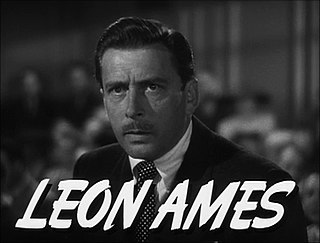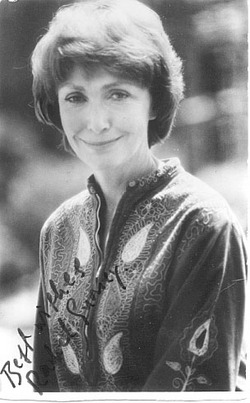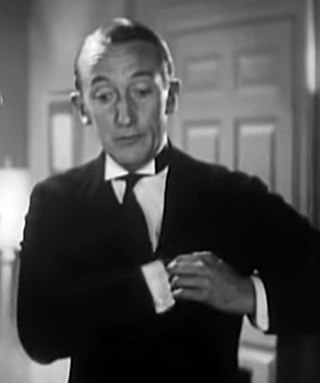
Dame Flora McKenzie Robson was a British actress and star of the theatrical stage and cinema, particularly renowned for her performances in plays demanding dramatic and emotional intensity. Her range extended from queens to murderesses.

Friedrich Robert Donat was an English actor. He is best remembered for his roles in Alfred Hitchcock's The 39 Steps (1935) and Goodbye, Mr. Chips (1939), winning for the latter the Academy Award for Best Actor.

Leon Ames was an American film and television actor. He is best remembered for playing father figures in such films as Meet Me in St. Louis (1944) with Lucille Bremer, Margaret O'Brien and Judy Garland as his daughters, Little Women (1949), On Moonlight Bay (1951) and By the Light of the Silvery Moon (1953). His best-known dramatic role may have been as DA Kyle Sackett in the crime film The Postman Always Rings Twice (1946).

Gay Divorce is a musical with music and lyrics by Cole Porter and book by Dwight Taylor, adapted by Kenneth Webb and Samuel Hoffenstein. It was Fred Astaire's last Broadway show and featured the hit song "Night and Day" in which Astaire danced with co-star Claire Luce.

Ernest Frederic Graham Thesiger, CBE was an English stage and film actor. He is noted for his performance as Doctor Septimus Pretorius in James Whale's film Bride of Frankenstein (1935).

Rachel Gurney was an English actress. She began her career in the theatre towards the end of World War II and then expanded into television and film in the 1950s. She remained active, mostly in television and theatre work, into the early 1990s. She is best remembered for playing the elegant Lady Marjorie Bellamy in the ITV period drama Upstairs, Downstairs.

Robert Douglas Finlayson, known professionally as Robert Douglas, was an English stage and film actor, a television director and producer.

James Bridie was the pseudonym of a Scottish playwright, screenwriter and physician whose real name was Osborne Henry Mavor. He took his pen-name from his paternal grandfather's first name and his grandmother's maiden name.

Francis Loftus Sullivan was an English film and stage actor.

The Piccadilly Theatre is a West End theatre located at the junction of Denman Street and Sherwood Street, near Piccadilly Circus, in the City of Westminster, London. It opened in 1928.
H. K. Ayliff was an English theatre director who directed Shakespeare in contemporary dress as early as the 1920s, as well as Yellow Sands on Broadway.

Saville Esmé Percy was an English actor who specialized in the plays of G.B. Shaw and appeared in 40 films between 1930 and 1956. He was born in London and died in Brighton.

Claud Allister was an English actor with an extensive film career in both Britain and Hollywood, where he appeared in more than 70 films between 1929 and 1955.

Romney Brent was a Mexican actor, director and dramatist. Most of his career was on stage in North America, but in the 1930s he was frequently seen on the London stage, on television and in films.

Edmund Willard was a British actor of the 1930s and 1940s.

Flesh and Blood is a 1951 British drama film with Richard Todd in a dual role. Based upon the play A Sleeping Clergyman by James Bridie, it tells the story of three generations of the Scottish Cameron family, with its various conflicts and romances.

The Festival Theatre, now known as Malvern Theatres, is a theatre complex on Grange Road in Malvern, Worcestershire, England. Malvern Theatres, housed in the Winter Gardens complex in the town centre of Great Malvern, has been a provincial centre for the arts since 1885. The theatre became known for its George Bernard Shaw productions in the 1930s and from 1977 onwards, along with the works of Edward Elgar. Up until 1965, 19 different plays of Shaw were produced at the Malvern Festival Theatre, and six premiered here, including The Apple Cart at the opening Malvern Festival in 1929, Geneva, a Fancied Page of History in Three Acts in August 1938 and In Good King Charles's Golden Days in August 1939.

Russell Collins was an American actor whose 43-year career included hundreds of performances on stage, in feature films, and on television.

A Little Bit of Fluff is a British farce written by Walter W. Ellis which was first staged in 1915 and went on to have a long original run. Starring Ernest Thesiger, it ran at the Criterion Theatre, London, between 1915–1918, for a total of 1241 performances.

Dorice Fordred was a South African actress, best known for character parts and Shakespearean roles on the London stage. The Brooklyn Daily Eagle commented in 1931, "She is one of those rare things, a young and attractive character actress."



















